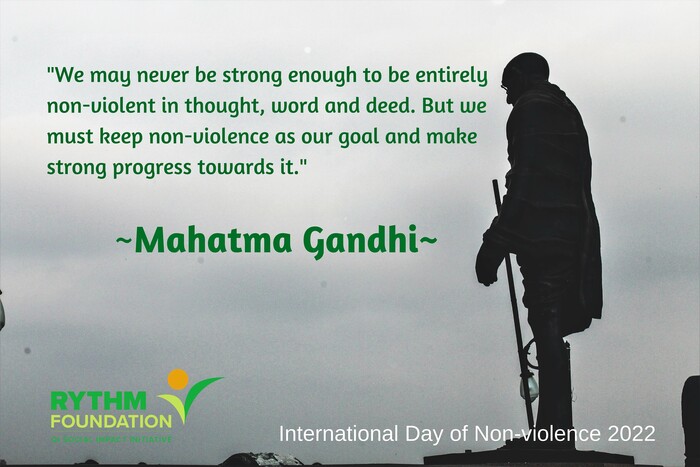Mahatma Gandhi, who helped lead India to independence, inspired non-violent civil rights and social change worldwide. Throughout his life, Gandhi remained committed to his belief in non-violence, even under oppressive conditions and in the face of seemingly insurmountable challenges.
Today, October 2nd, is not only Gandhi’s 153rd birthday but has also been celebrated worldwide as the International Day of Non-violence for the last 15 years.
In 2007, the United Nations declared the date an occasion to disseminate the message of non-violence through education and public awareness. The resolution to commemorate the day “reaffirms the universal relevance of the principle of non-violence and the desire to secure a culture of peace, tolerance, understanding, and non-violence.”
Gandhi and his teachings have greatly inspired the values of RYTHM Foundation as the social impact arm of the QI Group in many ways. RYTHM, an acronym for ‘Raise Yourself To Help Mankind,’ is built on the principles of Empowerment, Volunteerism, and Resilience derived from the teachings of Gandhi.
Ultimately, our work reinforces his cherished messages of peace, non-aggression, and simplicity. The greatest tribute we can pay him is to practice the changes we want to see in the world. Here are a few suggestions on how today’s society can do that:
Respect everyone. Respect is an essential element of societal living. Fundamentally, it means accepting people for who they are, even when they are unlike you or have ideas you may oppose. In addition, building respect in your relationships inculcates feelings of trust, safety, and well-being. Intriguingly, healing relationships are considered a real success in non-violence, something violence can never achieve.
Oh, and respect yourself too. The Russian novelist Fyodor Dostoevsky could not have said more succinctly: “If you want to be respected by others, the great thing is to respect yourself. Only by that, only by self-respect, will you compel others to respect you.” From a psychological viewpoint, self-respect is key to positive mental health and well-being. It matters because it helps you develop coping skills, handle adversity, and put the negative into perspective.

Care for Mother Nature. Our planet is arguably our most precious resource. Yet, we find it hard to treat it with respect. Unfortunately, so many things ingrained into widespread culture harm the earth. For example, throwing food waste in the garbage contributes significantly to climate change, and consuming more than we need takes up our precious resources. Some ways you can leave the earth better than when found include
Go vegetarian or vegan. From environmental concerns to health benefits and traditions, there are plenty of reasons why people have adopted plant-based diets throughout history. Another reason relates to violence: animal cruelty for meat consumption poses severe threats to the planet, contributing to environmental problems, including land degradation, climate change, and biodiversity loss. In addition, limiting or abstaining from meat consumption would consume less of our limited resources on earth.
Learn about non-violence. Read a biography of Gandhi (or other renowned peace activists like Martin Luther King or Nelson Mandela) to study the philosophy of peaceful social change and non-violent civil obedience. In addition, you will not find a lack of lectures, public discussions or exhibitions about non-violence, peaceful social activism, and other related practices on social media. So, get scouring the internet right now!
As Gandhi also famously said, “You must be the change you wish to see in the world.” To RYTHM Chairperson Datin Sri Umayal Eswaran, this means, “Bring the change you desire by your actions. Focus on your beliefs and thoughts because when we improve ourselves, the directions in the world will also change for the better.
“As humans, if we want to evolve, we want this world to be a better place. And we need to change from within,” she adds.





